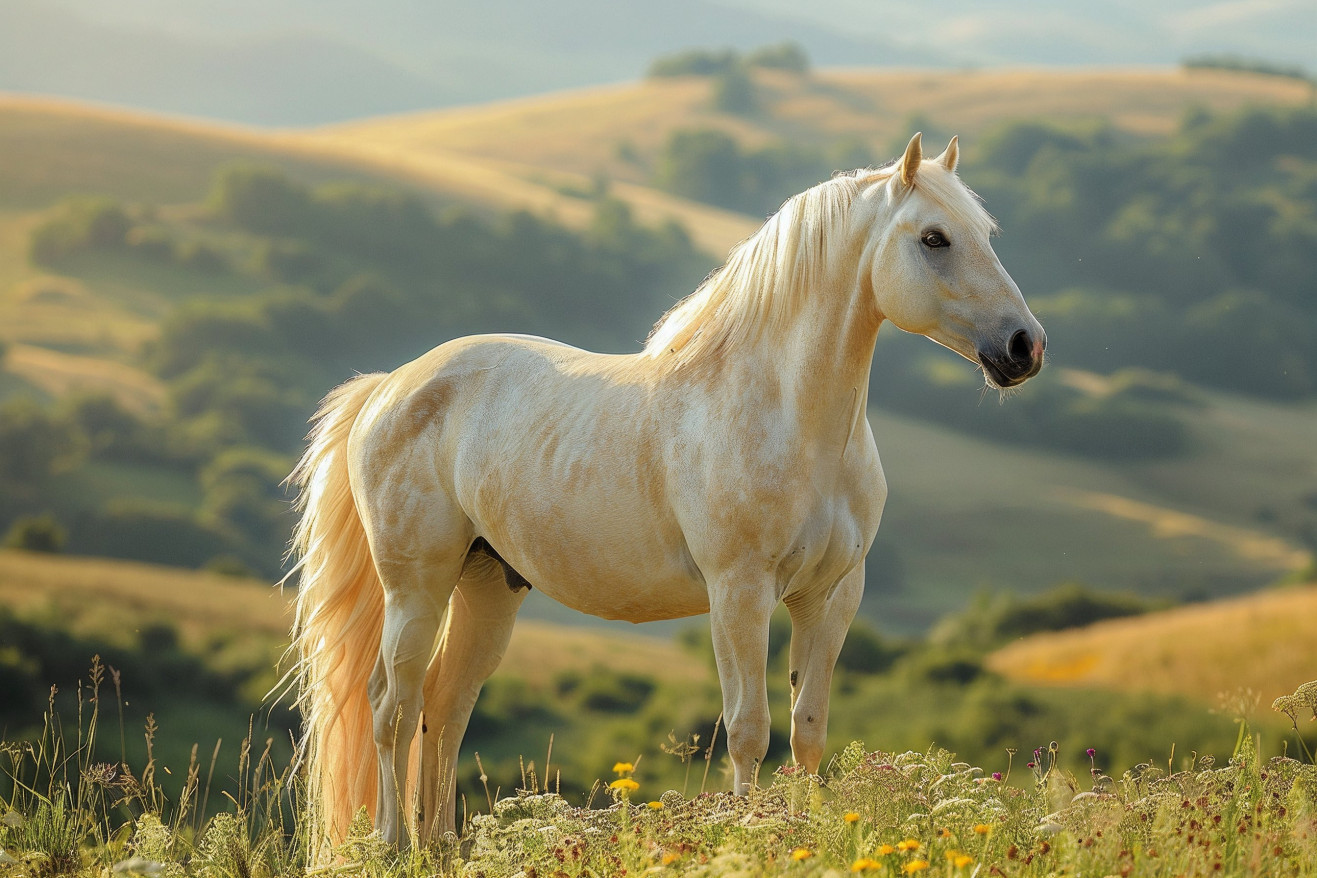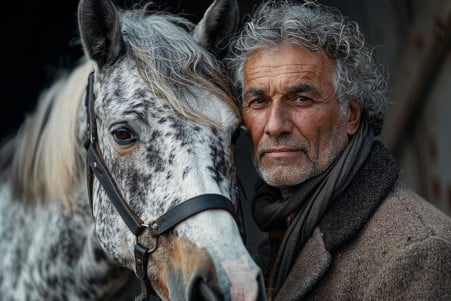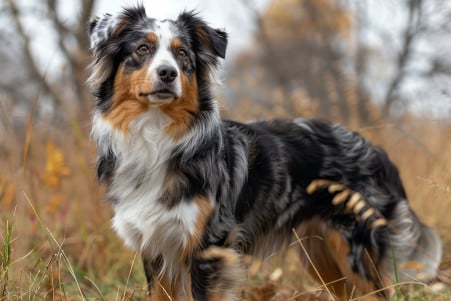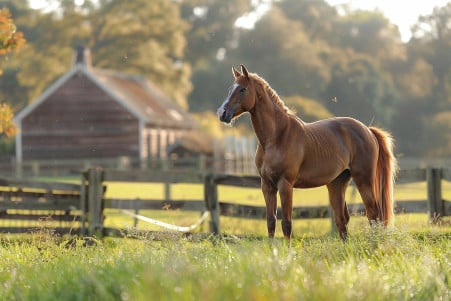How Long Does a Horse Live? Insights into Equine Lifespan
11 March 2024 • Updated 11 March 2024

From famous racehorses to trusted pets, many things can impact how long a horse will live. In general, horses that are kept as pets can live to be between 25 and 30 years old, thanks to improvements in veterinary care and nutrition, while horses in the wild live to be about 15 years old. A horse’s genetics, care, and how much they are exercised can all play a part in how long they live.
In this article, we will take a deep dive into the lifespan of horses, covering a wide range of topics from veterinary science and genetics to the care of horses.
We will look at research on health management, the effects of exercise and training, and the genetics of equine longevity. This interdisciplinary research will give a thorough look at the factors that impact how long a horse lives and how those factors can be changed.
How long does a horse live?
Pulling Apart the Strands of Time: The Most Important Factors That Affect Horse Longevity
Veterinary care is one of the most important factors in helping horses live longer lives. Regular check-ups and the management of diseases are both important for helping horses live long and healthy lives in their senior years, as shown in the article Welfare of Aged Horses, which is available through PMC.
Nutrition is another important factor that can help horses live longer lives. By adjusting their diets to meet their changing needs, horse owners can help ensure that their horses stay healthy and strong as they age.
One of the most important ways to improve a horse’s quality of life is by managing their environment, which includes making sure that they have access to shelter, turnout, and hoof care. This is especially important as horses age, as they will need more care to help prevent issues that could shorten their lives.
In addition, genetics and breeding are important factors in horse longevity, and studies have shown that there is a heritable component to this, as shown in the article Proactive Management of the Equine Athlete, which is available through PMC.
Finally, exercise and training are important factors in horse longevity. When horses are exercised and trained appropriately, they are more likely to be physically sound and healthy, while overtraining and harsh training methods can lead to injuries, shorten horses’ competitive lives, and potentially shorten their lives. The way these factors interact with one another shows that a multi-faceted approach is needed to help horses live longer, healthier lives in their senior years.
Preventing Premature Aging: Equine Health and Disease Management
Diseases can have a major impact on a horse’s health and lifespan. According to Dominion Equine Clinic, common diseases like Equine Influenza, Rhinopneumonitis, and West Nile Virus can be life-threatening, but the impact on a horse’s lifespan can be minimized with proper vaccinations and other preventive measures. For example, vaccinations against diseases like Equine Encephalomyelitis and Tetanus are necessary to prevent death in horses.
In addition to preventive measures, a horse’s life can be extended with preventive health care, including regular deworming, dental care, and hoof care. The team at Scott Dunn’s Equine Clinic notes that early detection and treatment of conditions like colic, laminitis, and Cushing’s disease is important because these conditions can shorten a horse’s life if they are not managed.
Regular veterinary care is important for horses for preventive care and early disease detection. Early intervention, which is based on early disease detection, including changes in a horse’s behavior, appetite, or physical condition, can improve the prognosis. With good health and disease management, horses can live longer, healthier lives and maintain a good quality of life.
How to Increase a Horse’s Lifespan Through Exercise and Training
Exercise has been shown to have a profound impact on the physiology of horses, and the way it is implemented changes as horses age.
However, even in old age, horses can still benefit from regular exercise, which can help stave off some of the cardiovascular and muscular declines that come with aging.
This is shown in the study “Aging and How It Affects the Response to Exercise in the Horse” by Heidi A. Brady, which demonstrated that the right exercise programs can improve the health of aging equine athletes, proving that training programs need to be adjusted to meet the needs of aging horses.
Training can also be used to improve performance and potentially extend a horse’s competitive years. For example, the study by Alyssa A. Logan and Brian D. Nielsen found that starting horses in exercise programs at a young age was associated with longer competitive careers, with evidence that moderate exercise in young horses can improve musculoskeletal health.
The results of the study “The Emerging Role of Hypoxic Training for the Equine Athlete” by Joshua Denham show that new training techniques like hypoxic training, where horses are trained in low oxygen environments, can be used to improve endurance and muscular health.
When you put all of these factors together, it’s clear that exercise, training programs, and the age at which they are started all have a big impact on a horse’s lifespan and quality of life. However, with the right interventions, horses can live longer, healthier lives and maintain a higher level of performance well into old age.
Horse Lifespan: Exploring Genetic and Breeding Influences
The genetics of horse longevity are complex and have many aspects. A study in ScienceDirect found that genetic factors are involved in the heritability of certain traits, including the number of years a show jumping horse competes, which had a heritability estimate of 0.11. This suggests that selective breeding for longevity could be possible.
In addition, the study found that early performance traits were positively associated with a longer career, which means these traits could be used in breeding programs to promote longevity.
Epigenetics also plays a role in the aging process. A study in PMC reported that DNA methylation patterns in horses can now be studied and that these patterns change with age and are similar among mammals. This is a new area of research that may help scientists understand how genetic and environmental factors interact to affect horse longevity.
The relationships between health, conformation, and longevity are also influenced by genetics. Breeding practices that focus on certain traits may inadvertently affect longevity. As genomic research advances, the interaction between heritable factors and the way horses are managed will continue to affect the future of equine health and longevity, including the development of nutritional approaches that can further improve health.
Tailoring the Perfect Diet: How Nutrition Can Help Horses Live Longer
As horses get older, their dietary needs change. According to a study in PubMed, some geriatric horses can be fed a normal diet, while others need special care due to conditions like pituitary pars intermedia dysfunction (PPID) and dental issues.
The best nutrition for older horses is high-quality forage with the right minerals and vitamins. If the forage isn’t providing enough energy, adding processed grains or fats can help with digestibility and reduce the risk of digestive issues.
Weight management and nutrition are key to slowing down the aging process. According to Mad Barn’s Research Bank, underweight but otherwise healthy older horses can be helped by a diet that includes 12% to 16% crude protein. For horses with severe dental issues, soaked hay cubes or sugar beet pulp can be used to provide fiber.
Research in PubMed has shown that caloric restriction and manipulating macronutrients can delay the onset of age-related diseases and increase longevity. Feeding times should be managed carefully to avoid sudden changes that can impact metabolism, especially during periods of starvation and refeeding.
To create a diet that supports longevity, it’s important to make sure that the nutrition you’re providing to older horses is tailored to their specific health needs. This will help ensure that they stay healthy and can be part of a larger discussion about comprehensive care strategies that can help make a horse’s golden years as good as possible.
The Home Stretch: Factors That Impact Horse Life Expectancy
Horses are beautiful, powerful creatures, and knowing what impacts their life expectancy can help ensure they live as long as possible. It’s been shown that domesticated horses live an average of 25 to 30 years, while wild horses live an average of 15 years, and this is due to a mix of environmental factors and human interference.
The key to helping horses live longer lives is a well-rounded approach to care that includes regular veterinary care, proper nutrition, genetics, and exercise and training.
This well-rounded care, which also includes hoof care, disease prevention, and management, is the foundation of a long life for a horse. Vets, geneticists, and nutritionists are constantly working to improve our knowledge with new care techniques, genetic information, and nutrition plans that can help ensure these beautiful animals are as healthy as possible throughout their lives.
In the end, it’s up to us, the horse owners and caregivers, to ensure our horses live as long as possible. By taking on this responsibility, we can make sure we’re doing everything we can to help our horses live the longest, healthiest lives possible, and in doing so, we can help ensure they have the best quality of life for every day we’re lucky enough to spend with them.


